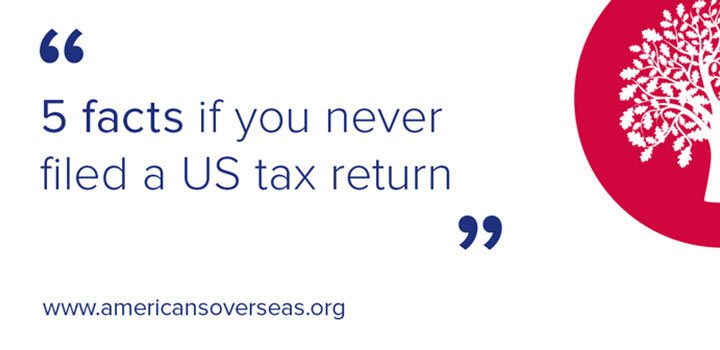
An American living abroad? 5 things you need to know about the US tax filing obligation according to Time

Are you an accidental American or an American citizen living abroad? Are you a US person through your parents or are you a Green card holder? Then, you might not be aware of your obligation to also file taxes in the United States.
Do you have an American tax filing obligation even if you might never have lived or worked in the United States? Yes, you do! The reason is that the US is the only developed country in the world where tax obligations are based on citizenship rather than where you live or work. Even if you are a U.S. citizen living in another country, you have a tax-filing obligation.
Here are five things you need to know about your American tax filing obligation:
1. I do not live in the US, so I don’t have to file US taxes.
Contrary to popular belief among expats, the obligation to file U.S. taxes does not end when you take up residence in a new country. The United States is one of only two countries in the world (the other being Eritrea) that taxes its citizens no matter where they reside.
2. I do not owe taxes to the U.S., so I don’t have to file a U.S. tax return.
To prevent double taxation on income earned by U.S. citizens living abroad (i.e., tax imposed by the U.S. and the country of residence), the U.S. tax code contains provisions that can reduce or eliminate the obligation to pay U.S. taxes.
However, they do not eliminate your obligation to file a U.S. income tax return on an annual basis. If you do not do this, the IRS can impose penalties. For example, a $10,000 penalty may be imposed for filing your tax return overdue.
3. I do not have a balance of $10,000 in my foreign bank account, so I do not have to inform the IRS about my money.
The FBAR (Foreign Bank and Financial Account Report) is an informational report that is submitted electronically to the Treasury Department. Any U.S. account holder with a financial interest in or signature authority over one or more foreign financial accounts exceeding $10,000 in total within a calendar year must file the form.
This means that if you have more than one financial account, the balance of all your accounts needs to be added together to see if you pass the $10,000 threshold. You have to include checking, savings, investment, pension, and mutual fund accounts.
4. My pension plan is tax-deferred in the country where I live, so it is also tax-deferred in the United States.
In many countries, individuals are allowed to contribute to a pension plan or other investment savings plan and enjoy tax deferral until distributions are made from the plan upon retirement.
This has no bearing on the U.S. tax treatment of your foreign plan. This may result in the obligation to pay actual taxes to the IRS, since foreign tax credits may not be available to reduce your U.S. tax obligation.
5. I have never filed American taxes, so I cannot file without incurring hefty penalties from the IRS.
Unknown to many, late filers can apply to IRS tax amnesty programs. Under the so-called Streamlined Procedure, non-willful taxpayers can come clean without getting penalties.
If you participate, you are required to file only the prior three years of income tax returns and six years of FBARs. Over the last several years, tens of thousands of late filers have been enticed to catch up with the IRS under this program.
Get more information from Americans Overseas
helps Americans living abroad to become US tax compliant in an organized way and avoid unnecessary double taxation. Based on your personal situation, we introduce you to the appropriate US tax advisor in our AOS network. They will make you a tailor-made offer to help with your tax filings. Free of charge and free of any obligations.
Frequently asked questions
Understanding the US tax system, the obligations, and all the additional terms can be difficult. Especially if one lives outside of America. Is your question not answered? Contact us.
-
Who is required to file taxes in the US?
U.S. citizens and resident aliens who live abroad are generally required to file a federal income tax return and pay taxes on their worldwide income.
Read more... about Who is required to file taxes in the US? -
Do US citizens living abroad still have to file taxes in the US?
Yes, US citizens are required to file taxes on their worldwide income, regardless of where they are living.
Read more... about Do US citizens living abroad still have to file taxes in the US? -
How can I cash my US check?
Received an American check? You can cash your check in the following ways: cash the check at your own bank, transfer to another person (endorsement), cash checks using an online service or cash the check by another bank.
Read more... about How can I cash my US check? -
Are there any special tax forms required for US citizens living abroad?
US citizens living abroad may be required to file Form 2555 and/or Form 1116 to claim the foreign-earned income exclusion.
Read more... about Are there any special tax forms required for US citizens living abroad? -
What is FBAR filing?
FBAR (Foreign Bank Account Report) filing is the requirement for certain U.S. individuals and entities to report their foreign financial accounts to the Financial Crimes Enforcement Network (FinCEN) of the U.S. Department of Treasury. The FBAR filing requirement applies to U.S. persons who have a financial interest in, or signature authority over, one or more foreign financial accounts if the aggregate value of those accounts exceeds $10,000 at any time during the calendar year.
Read more... about What is FBAR filing?





